|
Korean movie serial killers are a particularly unpleasant bunch. Think of the coldly psychopathic Je Yeong-min in Na Hong-jin’s 2008 The Chaser [Chugyeokja], or the resourcefully monstrous Jang Kyung-chul in Kim Jee-woon’s 2010 I Saw the Devil [Ang-ma-reul bo-at-da]. These are not men that any sane person would want to go anywhere near at any time of the night or day. Such creatures primarily (though by no means exclusively) target young women, whom they kill without a flicker of remorse, and often take their horrible time about doing so.
Sometimes, they conceal their true nature behind a mask of surface respectability or youthful good looks, which they employ to lure and trap the unwary. That’s certainly the case with Do-sik (Wi Ha-joon), a good-looking and seemingly personable young man who offers a late night lift to an unnamed woman who has just finished work and lost a race to grab the only waiting taxi. To her credit, the woman declines his offer on the basis that she’s not going to hop into some random guy’s car, instead returning to her phone conversation and walking away. From the shift in his expression, it's clear that this does not sit well with Do-sik, who then exits his van and pulls open the side door. The woman is then halted by the faint sound of a weak male voice calling out for her help. Clearly concerned – and maybe just a little foolhardy – she edges back towards the vehicle, and on reaching it discovers a seriously injured man lying within. It’s then that Do-sik calmly appears, puts on a face mask (safety first), and violently attacks the unfortunate woman. A short while later, a police car rolls up to the van. Have the police rumbled Do-sik? Have they hell. It transpires that they’ve been called there by Do-sik himself, who’s now pacing around outside of his vehicle, claiming to be shaken by his discovery of two bodies – one male and one female – in the nearby undergrowth. He even blags a cigarette from one of the cops to help calm his nerves. We’re only five minutes in and a few crucial facts have been established, that Do-sik is a dangerous serial killer, that he is able to switch personae on a dime (or, more appropriately, a Hwan), that he seems to enjoy playing games with the authorities by skating perilously close to his crimes, and that the local cops are not the sharpest guys in town.
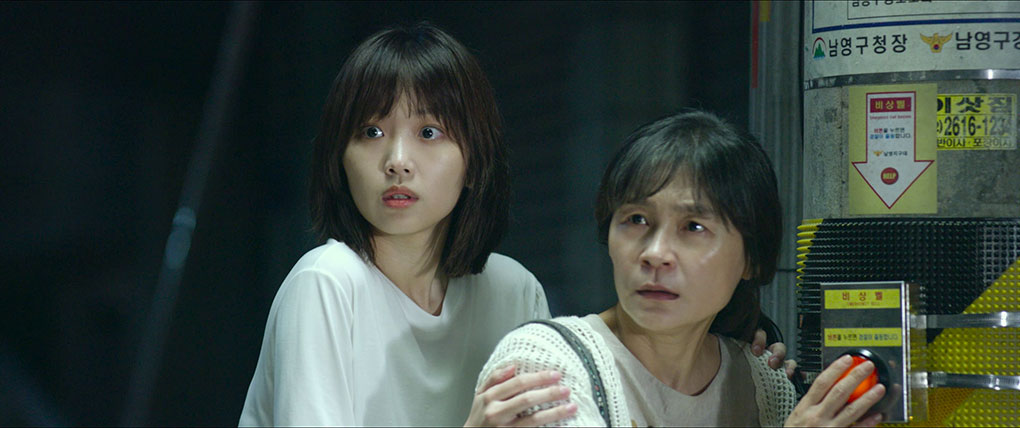
We’re then introduced to the other four main characters. Young Kim Kyung-mi (Jin Ki-joo) works as a deaf counsellor at a call centre. A strong-willed and independent woman who refuses to be held back by her disability, she takes no crap from a rude female caller, and when her manager asks his female staff if they will act (not for the first time, it appears) as eye candy at a dinner party for male business clients, she quickly volunteers. When the manager seems a little reluctant, Kyung-mi uses the textual display on her phone to suggest that it would be prejudicial for him to decline. At the dinner, she responds to the sleazy comments of the businessmen by swearing at them in sign language using insults that they completely misinterpret. Her deaf mother (Gil Hae-yeon), meanwhile, has been working at three times the pace of her colleagues at a small dressmaking firm, and now has enough money for a dream holiday for her and Kyung-mi on the warm beaches of Jeju Island. It's news that should set alarm bells ringing for anyone who knows their thriller cinema – have a dream holiday or a peaceful retirement planned for the immediate future, and you’re likely to come a serious cropper. If those plans have been made by a supporting character, that person will likely be the first to be dispatched.
Elsewhere, teenage Jung Choi-seo (Kim Hye-yoon) unsuccessfully attempts to sneak out for the evening wearing clothes that her older brother Jong-tak (Park Hoon) claims will get her killed. In that single short line, Jong-tak’s role as his sister’s protector – and, we soon learn, as a surrogate father after the loss of both parents – is immediately established, as is his belief in that male-centric bollocks that women somehow ask to be attacked because of how they choose to dress. Given what we’ve already witnessed, his words are also laced with a sense of foreboding over what may be to come. Although frustrated by what she regards as her brother’s over-protective nature, Choi-seo dutifully swaps her skirt for shorts, and when challenged by Jong-tak over their length, she is quick to point out that her choice of legwear is less revealing than his.
That the fates of all five characters are set to collide seems inevitable almost from the moment we meet them. It’s all a matter of how this occurs and what happens next, and while I’d usually now be describing in some detail how the first act unfolds, I feel that a basic outline is all you really need here. Chance lands Kyun-mi’s mother in Do-sik’s sights, but when Choi-seo walks past on her way home from her evening out, he switches targets and attacks her instead. As Kyun-mi returns from parking her car and walks towards her waiting mother, she is alerted to the injured Choi-seo’s presence in a darkened side alley, and when Do-sik moves in to eliminate this troublesome witness, she breaks free and runs for her life. None of this is exactly new to the serial killer subgenre, of course, but it’s what first-time feature writer and director Kwon Oh-Seung does with the concept that makes Midnight one of the most gripping thrillers I’ve watched in some time.
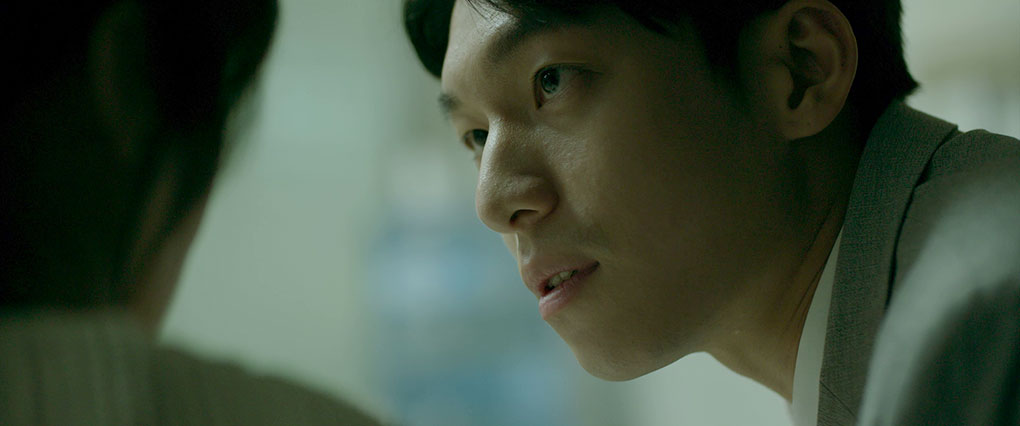
Disadvantaging the potential victim of a ruthless killer by robbing them of one of their five senses is not exactly new ground for cinema, with the blindness of the likes of Wait Until Dark, See No Evil and Julia’s Eyes giving way to deafness in films like Hush and A Quiet Place. In each case, this initial vulnerability is at one point transformed by the potential victim into an advantage to be used against their attacker, and while to some degree this is also the case with Midnight, here those small gains – the ability of Kyun-mi and her mother to communicate silently being the most paramount – are repeatedly undermined, as much by public prejudice as any ingenuity on the part of the wily Do-sik. This aspect of the film expands a key plot mechanic into the realms of social commentary, as Kyun-mi and her mother’s inability to quickly communicate with distracted policemen results in the officers making howling errors that see the wrong person arrested, and put the lives of both women at further risk. Later, when a terrified Kyun-mi flees into the seeming safety of a crowded shopping district, her non-verbalised terror, and the fact that she is carrying one of Do-sik’s many knives for protection, is completely misinterpreted by those around her, who assume she has lost her mind and is a threat to their safety. Complicating matters for both women is that Do-sik is clearly well practised in the art of deception, and in the back of his van has a wardrobe of costumes that allow him to convincingly assume a variety of personae. Thus, after being chased relentlessly by a masked and baseball-capped Do-sik, when Kyun-mi is approached a short while later by him dressed in a suit and asking politely about his missing sister, she takes him for what he is pretending to be. Later, when his attempt to kill the far tougher Jong-tak backfires, this air of male middle-class respectability sees the police assume instantly that he is the victim of the blue-collar Jong-tak’s aggression, ignoring Jong-tak’s angry protestations and responding instead to instantly transformed Do-sik’s faked cries of terror.
This chameleonic aspect of Do-sik’s personality, and the fact that his quest to tidy up loose ends is transformed into a cat-and-mouse game with Kyun-mi that he seems to get a kick out of playing, injects a strong level of unpredictability into what in less skilled hands might easily have sunk under the weight of narrative inevitability. Kwon also plays on our familiarity with genre tropes to misdirect us into anticipating jolts that do not always occur, which has the effect of keeping us on our toes regarding where the next manifestation of the threat will come from. This approach is first established when Kyun-mi’s mother walks cheerfully down a darkened alleyway towards her daughter’s car, which we just know from the manner in which it is shot and edited will see the mother snatched into the darkness at one point by the waiting Do-sik. Except it doesn’t happen. It’s a hugely effective wind-up, one whose true purpose is to wordlessly establish the function of the car’s on-board motion detector, which will later be employed to put a fresh spin on a well-worn ‘gotcha’ surprise. Motion-detecting lamps and a cymbal-banging toy that responds to sound are also used to transform the theoretical safety of an apartment interior into a maze of potential threats, and to also provide the sort of last-second warning that could prove the difference between escape and a felling axe in the head (and yes, there is a direct reference to The Shining in here). And it’s so refreshing to watch a thriller in which mobile phones are not disabled by a loss of signal but instead made a crucial aspect of the narrative, being used by Kyun-mi to write down words for others that she cannot clearly vocalise, as a form of textual communication between her and her mother when they are separated, as proof to Jong-tak that his sister has gone missing, and by Do-sik to mislead and even taunt his victims.
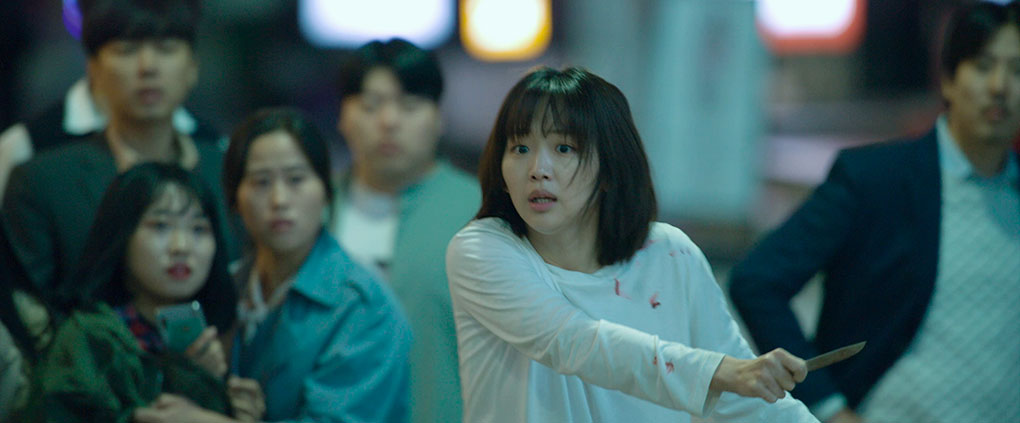
For a first feature, Midnight is a seriously impressive achievement on all fronts. Structurally, it’s a lot more complex than the above brief synopsis might suggest, with a whole series of carefully calculated twists and some crucially timed sequences in which Jong-tak and Kyun-mi’s stories intersect. It’s also really well directed, and on this front Kwon is well served by Cha Taek-gyun’s handsome night-time scope cinematography, Lee Gang-hui’s immaculate editing, and Hwang Sang-jun’s alternately pulsing and pounding score. This combination of elements moves into high gear during the film’s nail-biting chase scenes, where a hyper-smooth Steadicam glides gorgeously with and counter to the furiously sprinting actors, further accelerating the pace and building a sometimes breathless sense of suffocating panic. And it never lets up. From the moment Do-sik crosses paths with the female protagonists, Kwon piles on the pressure and just keeps it coming, with brief pauses for the audience to catch its collective breath proving few and far between. He also makes impressive and immersive use of silence, placing us inside the heads of his hearing-impaired characters in a way that marries sound to camera movements and framing to smoothly move the film from the objective to the subjective and back again.
That Kwon didn’t follow the lead of John Krasinski’s A Quiet Place and cast hearing impaired actors in the lead roles of is a bit of a shame, resulting in a film that confronts prejudicial attitudes to the deaf that has no deaf people in it. Not being privy to the circumstances that shaped this decision, I’m willing to give Kwon a pass on this, particularly as both Jin Ki-joo and Gil Hae-yeon are so completely convincing as Kyung-mi and her mother. That the two actors attended sign language classes together and based their character traits – even down to the way that they sign – on deaf people that they met and worked with during this preparation period really pays dividends here. Jin Ki-joo in particular shines in the later scenes, notably in a heartfelt speech in which she attempts to vocalise words that she has never heard (having had deaf friends and worked with deaf students over the years, this felt completely authentic to me), and the expression of wounded empowerment that crosses her face in the climactic scene is really something. Equally impressive is Squid Game’s Wi Ha-joon as Do-sik, his ability to switch from harmless-seeming everyman to a monster that oozes menace from every pore, often through nothing more that change of expression or body language, makes him one of the more unredeemable villains in recent cinema.
As is often the case with high-octane thrillers, I did find myself having to turn a blind-eye to occasional “oh come on” moment, or quietly explaining them away to prevent it from disrupting the flow. One that particularly got to me was the desk that Kyung-mi pushes against a door to prevent Do-sik’s entry and is then unable to pull away no matter what she does. I get that it’s easier to push than pull a heavy object, but there’s clearly still enough room on the far side of the desk for her to get behind it and give it a heave, something that she (in her panic, perhaps) never thinks of doing. It does at least prove sturdy enough to prevent Do-sik from opening the door, at least until the narrative requires him to violently do so. That the cops are a bit dopey at times is frankly nothing new for Eastern genre cinema, and is even acknowledged within the film’s narrative (the two policemen who walk up to an injured Jong-tak and bow in apology is one of the film’s few blackly comic moments), but I can’t be the only one who was left scratching his head after Kyung-mi and Jong-tak lose track of Do-sik at a crucial moment when all he did to lose them was turn around and amble away.
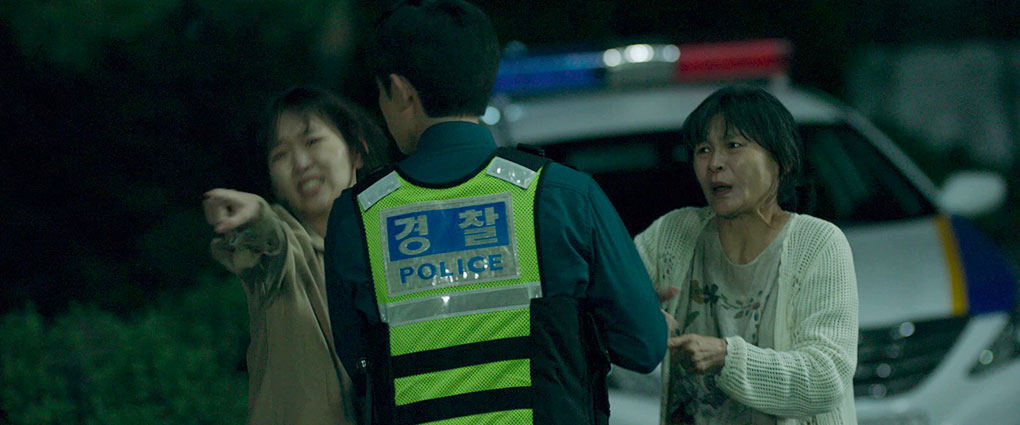
But these are small and frankly insignificant gripes in an otherwise superbly constructed, rivetingly performed, and unrelentingly tense thriller, one whose surface tension is impressively underscored by a sly critique of inequality of prejudice, one that resonates beyond the still patriarchal leaning of Korean society. It’s an auspicious debut, one that leaves me hungry for whatever Kwon might serve up next – it’s his choice, of course, but personally I’m really hoping he doesn’t stray far from a genre for which he has already shown such talent and flair.
Information on the shooting of Midnight is currently hard to come by, but considering the current rarity of celluloid-shot features and the ease with which modern HD cameras cope with low light, it seems almost definite that it was shot digitally. Framed in its original aspect ratio of 2.39:1, this is a largely gorgeous 1080p transfer, being crisply detailed with a supremely well-balanced contrast range when the lighting is bright (the early daylight scenes in the call centre and Jong-tak’s home, for example), but also coping well with the night-time street scenes, though many of these were likely shot with additional lighting and graded to look darker. Colour is naturalistic when the lighting is strong, and takes on a stripped-down, duotone feel under the amber streetlights or green-tinged striplights, though the blues of police lights or the interior of Do-sik’s van are also vividly captured. I did spot just the smallest hint of banding when the motion sensor lights in Kyung-mi’s apartment are pulsing, but that’s the nearest I could come to finding a flaw here. Excellent.
The DTS-HD Master Audio 5.1 surround Korean soundtrack is an interesting one. Korean movies, particularly those on Korean DVDs and Blu-rays, have for some time been the high watermark when it comes to mixing a surround soundtrack, but Midnight differs slightly from the often dynamic norm. While always crystal clear, the main film sound – particularly the dialogue – has a slightly flat feel, and I did wonder if this was a deliberate choice on the part of the filmmakers, given deafness of its principal characters. This all changes once the diligently used score kicks into gear, with the music spread around the room and pumping the lower bass frequencies when required. In all, a very solid job.
Optional English subtitles kick in by default. Surprisingly for a film featuring two deaf characters, there are subtitles specifically for the hearing impaired (which would include information on sounds and indicate who is delivering any off-screen dialogue).
Audio Commentary by Film Historian Kat Ellinger
Any commentary by writer and film historian Kat Ellinger is worthy of your time, and this is no exception. Having been on the Grimmfest Jury at which Midnight won the Best Feature award, she comes to this one as an enthusiastic fan, and as she delves into the film, she examines in considerable detail what it is that makes it so special, with particular emphasis on its underlying critique of gender and disability prejudice. Other areas covered include the difference in the psychology of killers in Western and Korean cinema, the common ways in which disability and deformity is employed in the horror genre, the connections to The Shining and The Spiral Staircase, the use of silence, the role of technology, and so much more. As ever, I found this enthralling, though for the first time I can recall found myself disagreeing with Ellinger on one point. As an enthusiast for the film, she takes issues with critics who have claimed that some elements require a suspension of disbelief, but also suggests that if the cops here had behaved realistically then there would be no film. In response, I’d argue that this would indeed pose a challenge for Kwon the screenwriter, but one that I’m sure that a bit brainstorming could have still found a way round – I just don’t buy that just making the cops a bit dim was the only solution. That said, I’d also argue that they’re not quite as dim as they first appear, and could write a whole paragraph on why they behave like they do, though freely admit that this would all be projection on my part and not the result of anything I saw.
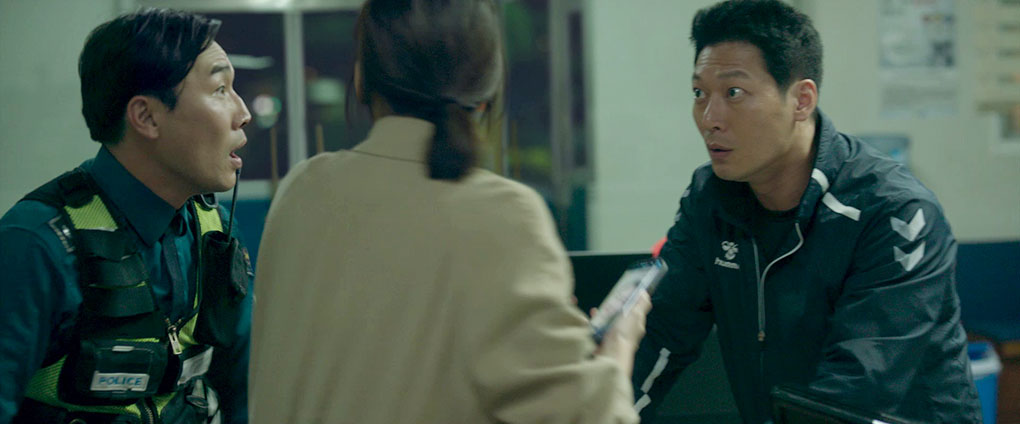
Korean Horror Cinema – Essay by Travis Crawford (22:24)
Critic Travis Crawford takes us on an educational trip through the history of South Korean horror cinema, focussing primarily on works from the 1960s and 70s that are largely unknown in the West. Covered in most detail are the films of directors Lee Yong-min and Kim Ki-young, none of whose work I must confess to having seen, and some of which has apparently since been lost. Consistently interesting, though it is a primarily audio-only affair that plays under the first 22 minutes of the film, which occasionally blurs to display a poster or photo relating to a title under discussion.
Booklet
The meat of this booklet is a detailed examination of the film by Australian film critic and author, Alexandra Heller-Nicholas, who explores the psychopathy of the character of Do-sik, as well as the role that deafness plays in the film and in horror and thriller cinema in general. I found this an enthralling read. The usual advice on setting up your screen for accurate viewing is included, but the movie credits are the most threadbare I’ve ever seen in the Eureka booklet, consisting only of the director (that he is also the writer is not mentioned here) and four of the five main cast members.
I’ve recently (and belatedly) caught up with a few of the Eastern thriller titles released on Blu-ray by Eureka over the past couple of years, and on the basis of those had an idea what to expect with Midnight. I was so wrong. The film had me in its grip from an early stage and just didn’t let go, and a second viewing only served to confirm just how tightly constructed and well-acted a movie this is. Being a Montage Pictures title, I wasn’t expecting much in the way of extras – the press release promised very little – so was pleasantly surprised by the Kat Ellinger commentary, the Travis Crawford audio essay, and the booklet article by Alexandra Heller-Nicholas, all of which are of a very high order, and the transfer is top-notch. As a result, this has to come enthusiastically recommended.
|